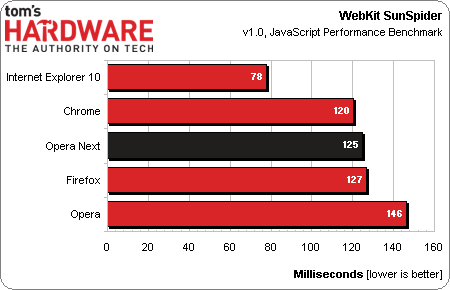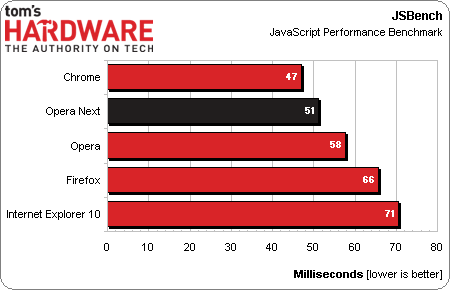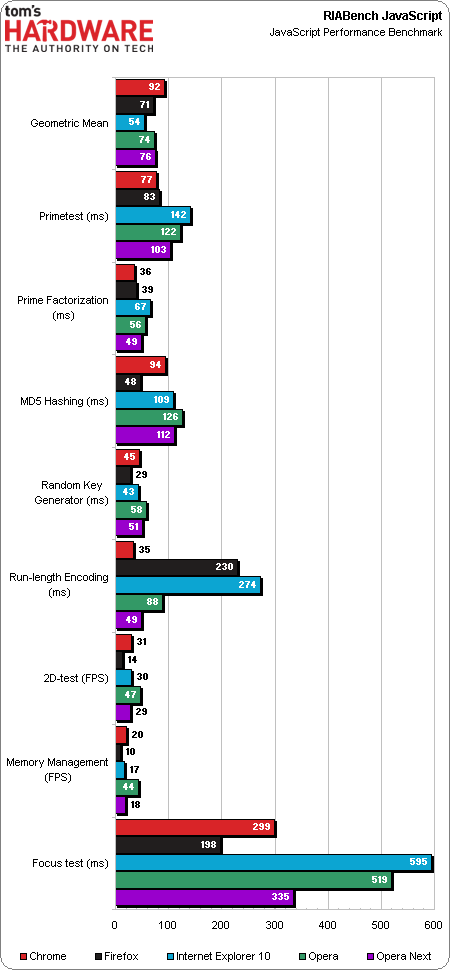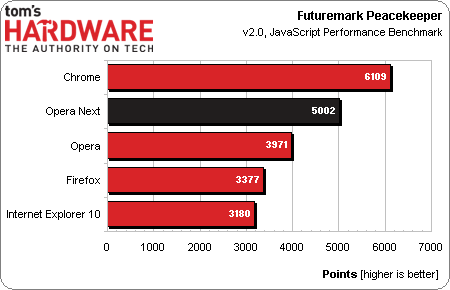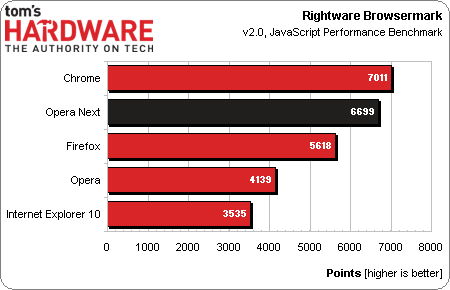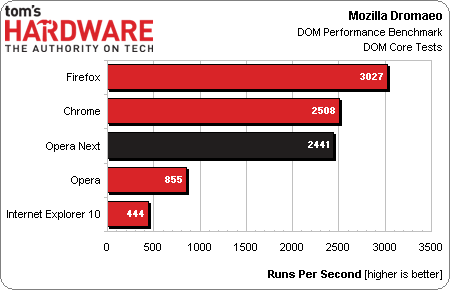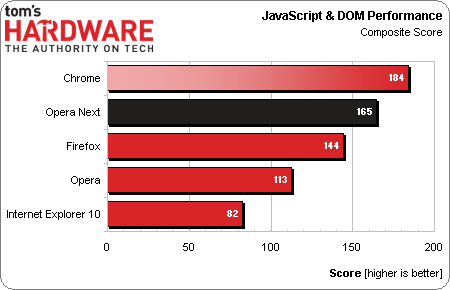Chrome 27, Firefox 22, IE10, And Opera Next, Benchmarked
Today, we have the latest benchmark results from the top four Windows-based Web browsers, along with a sneak peek at Opera's upcoming Chromium-based overhaul. Is this really a step-up from Presto/Carakan or just another Chrome clone?
JavaScript And DOM Performance
Why you can trust Tom's Hardware
JavaScript
WebKit's iconic SunSpider JavaScript performance benchmark makes a return to the Web Browser Grand Prix today, having finally been updated after nearly four years of stagnation. Besides being dormant, the 0.9.1 version of this test showed IE9 to be far faster than any other browser, which is usually a complete reversal of the results generated by similar JS performance tests. Let's see if the big one-dot-oh changes things.
Although the placing of the other four browsers looks consistent, it appears that the WebKit developers didn't modify SunSpider v1.0 to account for Internet Explorer's incredulously low scores. Unfortunately, this means SunSpider returns to the bleachers, and these results won't be included in today's scoring.
Now let's move on to today's other fresh face: JSBench. Like BrowsingBench, and unlike most off-the-shelf Web browser benchmarks, this test could be considered real-world. JSBench uses actual snippets of JavaScript that appear on several of today's most-visited Web sites.
Chrome takes the lead, followed by Opera Next in second place and the current version of Opera in third. At 66 seconds, Firefox places fourth, with long-term rival Internet Explorer bringing up the rear.
RIABench places Chrome in a commanding lead and IE10 in a distant last place, with Opera Next, Opera, and Firefox in-between the two. This test basically has Opera doing a trade-off, with Opera Next showing lower timed results, but the current version having higher FPS scores.
Futuremark also has Chrome in first place, with Opera Next taking the second-place position and the current version in third. Firefox and IE10 bring up the rear. In this test, Opera Next appears to be a marked improvement over the current version of Opera.
While Chrome comes away with another win in Browsermark, Opera Next is a much closer second-place finisher this time. Firefox places third, with Opera in fourth, about 2500 points behind Opera Next. IE10 places last yet again.
DOM
Firefox manages a victory when we test the Document Object Model, with JavaScript-winner Chrome taking a respectable second place, nearly tying with Opera Next. Opera's current incarnation earns a very distant fourth-place finish. IE10 again falls to dead last, with just half of Opera 12's already-miserable score.
JS/DOM Composite Score
Chrome is the obvious winner, with Opera Next coming in second, Firefox placing third, Opera 12 in fourth, and IE10 clearly last. Opera Next appears to offer a healthy boost in JS/DOM performance over the current version.
Current page: JavaScript And DOM Performance
Prev Page Wait Times: Page Load Next Page HTML5 And CSS3 PerformanceGet Tom's Hardware's best news and in-depth reviews, straight to your inbox.
-
Onus No, the Onus is not on Google; I'm using www.startpage.com for my searches.Reply
While this is interesting, I still encounter built-in pages (such as on routers or other network devices) that will not render cleanly in Firefox, but are perfect in IE. More often than not though, pages that would be filled with nuisance ads and popups are cleaned up nicely by Firefox with AdBlock+ and NoScript.
-
soundping A good test is rendering a heavy site like Huffington Post. They use a ton of flash and java scripts.Reply -
ivyanev While benchmarks are the way to compare browsers, they do not represent the feel you get- firefox might be faster but still feels sluggish compared to chrome or opera(the stable one).Reply -
pharoahhalfdead I would like to see benchmarks on page start up, and load times comparing ssd, hard drives, and ram drives. Maybe I missed these an a previous article, but I feel since ssd's and ram drives are getting more popular, benchmarks should prove or dispel the the 'so called' benefits they bring.Reply
I have both and start up times for IE are quick but page load times are horrendously slow, whereas FF has slow start up times but superfast page load times. It's possible that add-ons are contributing to that. -
mccainm Ever since I have compared Firefox and Chrome I've always found Chrome to start much faster (I'm running the Dev channel and my wife uses the Stable channel and they both take maybe 1 - 2 seconds to start cold or hot). Only IE beats both of them. Maybe Firefox 22 is that much faster and worth a try, but seeing as Chrome did so well in most categories I'll probably stick with it.Reply -
EzioAs Having move back to Firefox a couple years ago after Chrome, I don't intend to use Chrome (or any other browser) regularly anymore. I still give Chrome 2-3 tries a week (just to compare things) but Chrome isn't better than FF in 3 things:Reply
1) Pages load noticeably slower
2) Memory usage is indeed high (as seen in the benchmark above)
3) FF add-ons are much better than chrome extensions.
I never noticed any startup time difference for both FF and Chrome; it's possible they're both fast enough that it doesn't even matter at this point. I also like the FF toolbars better although that's really more of a personal preference. I've never tried maxthon though; heard it's pretty good. -
beoza I've never really noticed a difference in browsers speed wise. Sure some load pages faster than others, and some have issues with certain pages. But in the end they all take me to the same place. I use Firefox 95% of the time at home with adblock+, if I encounter an issue I clear cache, if it still has issues I switch to IE 10, usually this is all I need to do but once in a while IE has problems with a page and I just move on to something else. At work I'm stuck using IE10. The speed of a browser can also be affected by other factors like the speed of your connection, how many devices are on your network, what tasks your doing on the computer at the same time like gaming, downloading, streaming movies (netflix, hulu), and your hardware. You're not going to get much responsiveness on a 5yr old celeron w/2gb ram and Win XP while you're downloading a game, watching youtube and the A/V suite scans your computer in the background, and there's 5 other people all sharing your 10Mbps network. Which describes probably 50% of the users out there in the real world.Reply -
Someone Somewhere Opera Next (and every other browser) is a significant step down in terms of features/customization from the current version.Reply
I'll miss a hell of a lot of stuff when I move off Presto-based Opera. -
ElDani Well done on this test, I actually found the test results genuinely helpful and your summary/conclusion to be well thought out.Reply
Still, this test shows us once more, that no modern browser - I exclude Opera from this, since it isn't a maintained release anymore - must absolutely be replaced by the winner of such tests. If you don't mind performance weaknesses of the Internet Explorer in certain areas, or if your most-accessed websites don't require you to use a certain alternative, then even Microsoft's browser of choice can be okay for daily use (if only as an engine in products like Avant, Maxthon, etc).
The one thing I'm a bit curious about: why does Opera Next suddenly behave so differently from Chrome? Yes, there's a difference between Chrome 27 (WebKit) and Opera Next (Blink = Chrome 28), but if that's the only reason for the browser's weaker showing, then the future of Chrome doesn't look too good. What's your take on this? -
tomfreak I dont know how useful in this review when they are tested all the browser on a 1155 super computer, nobody is going to tell the diff if the browser is 0.25sec faster. Get some Brazos, Atom and run the test, these are the platform have problems with web browsing.Reply
